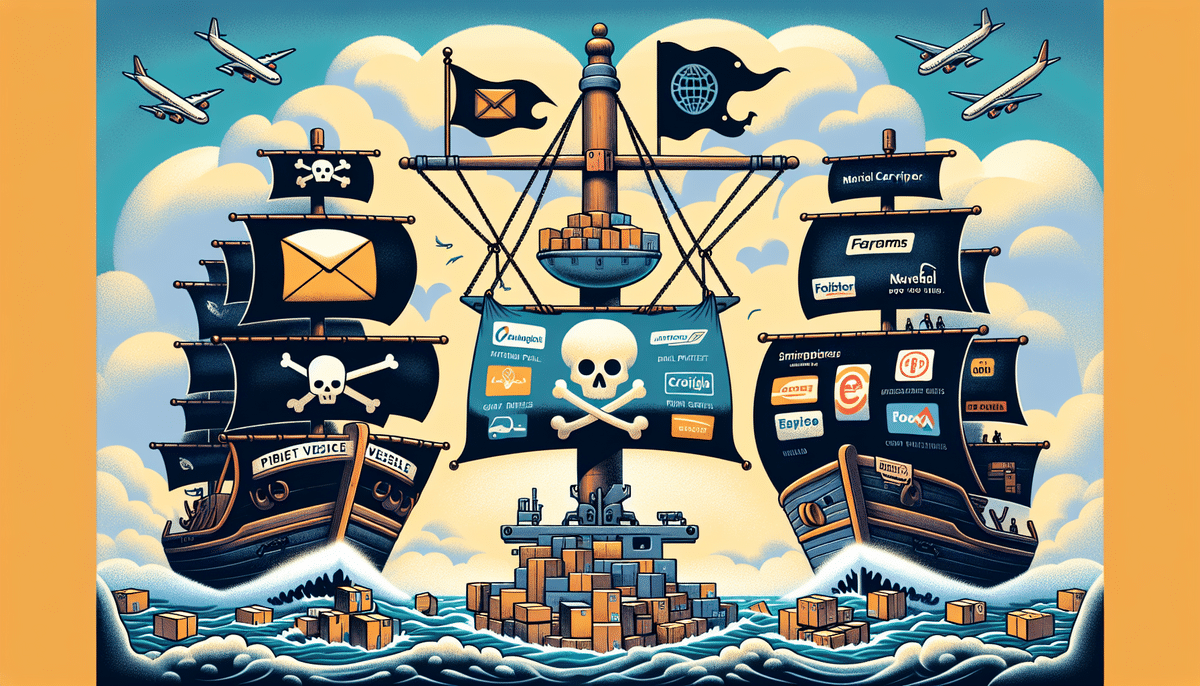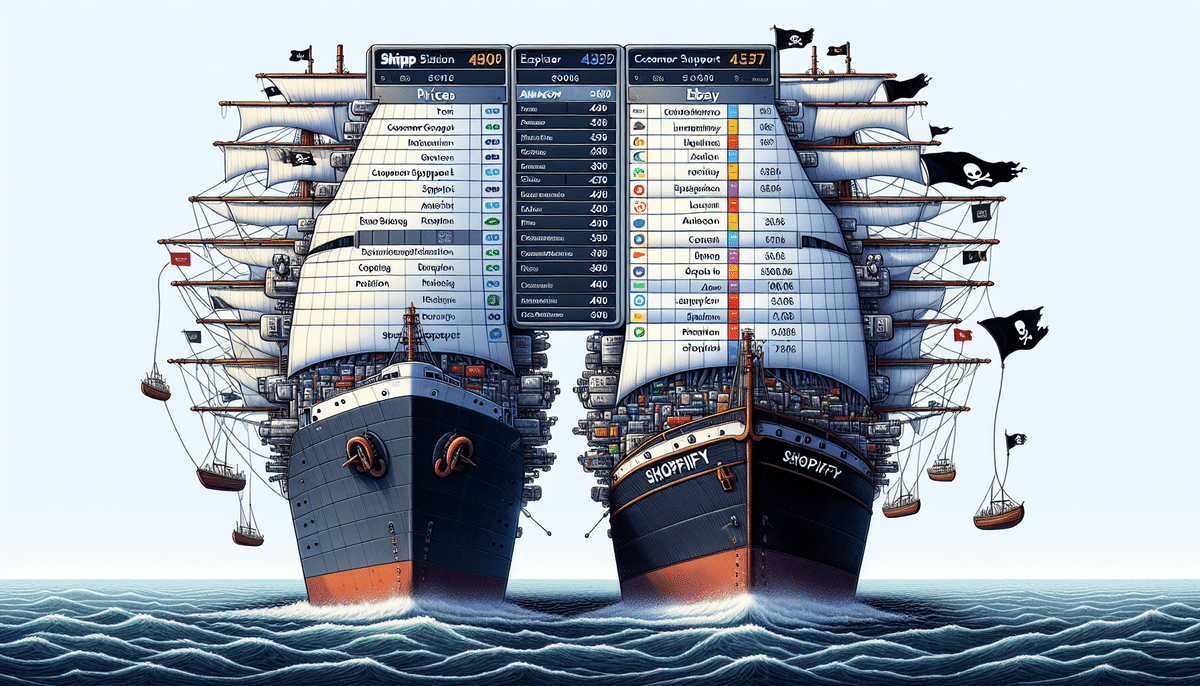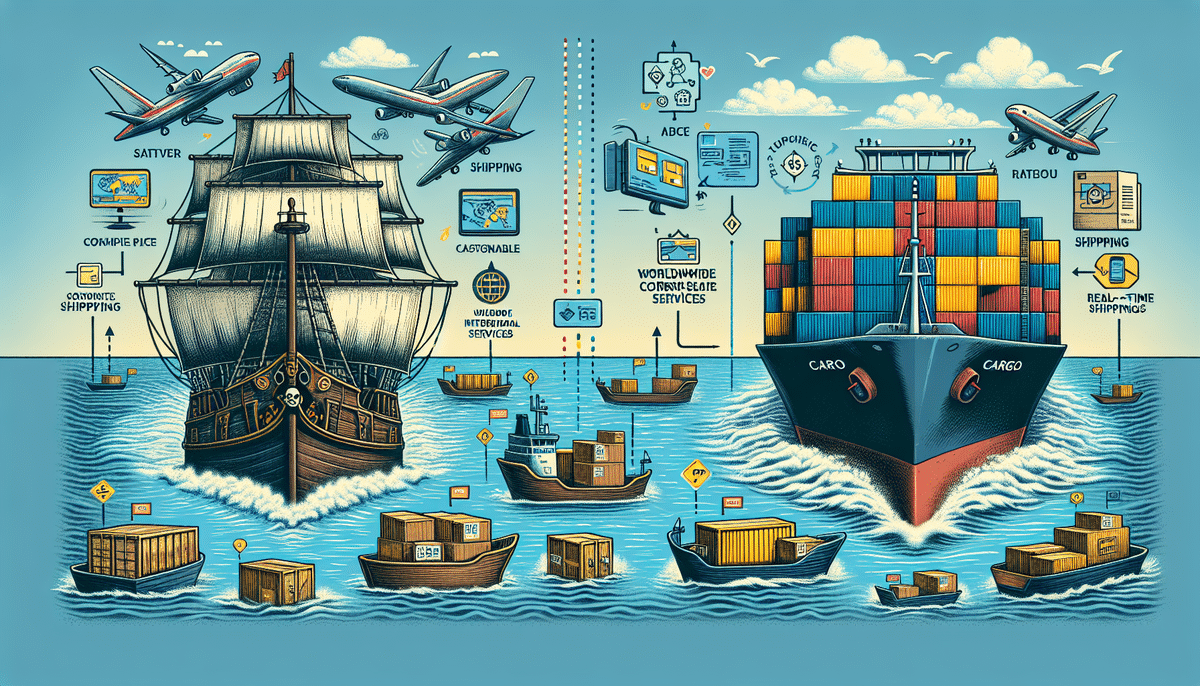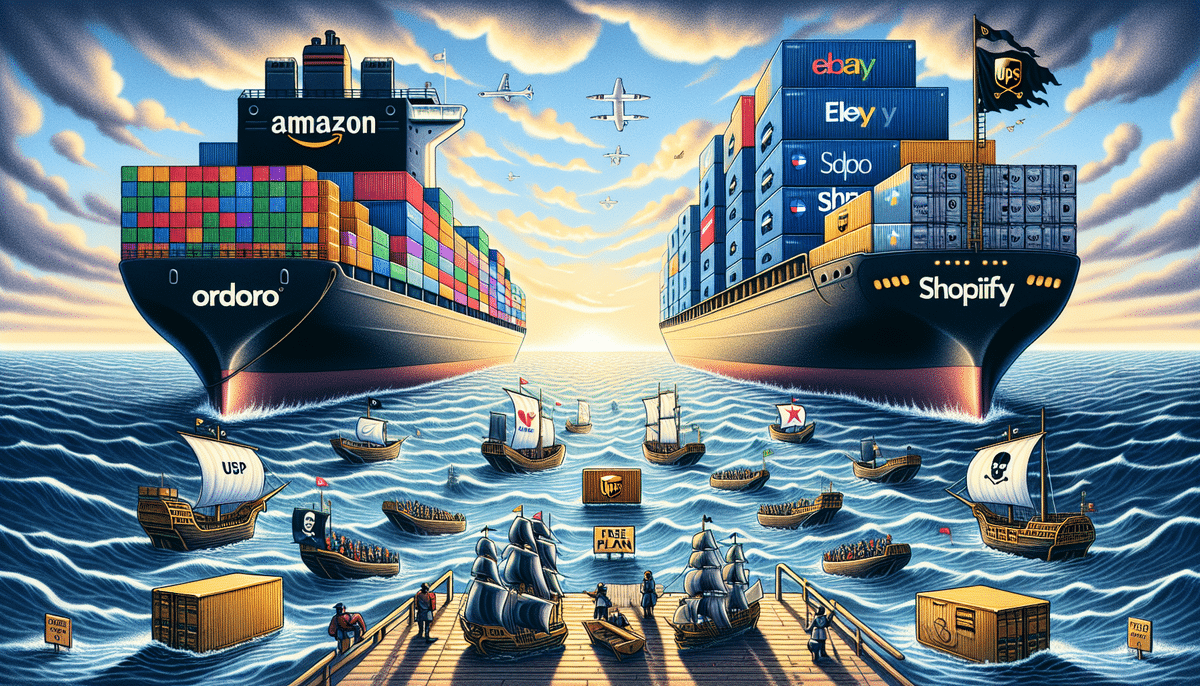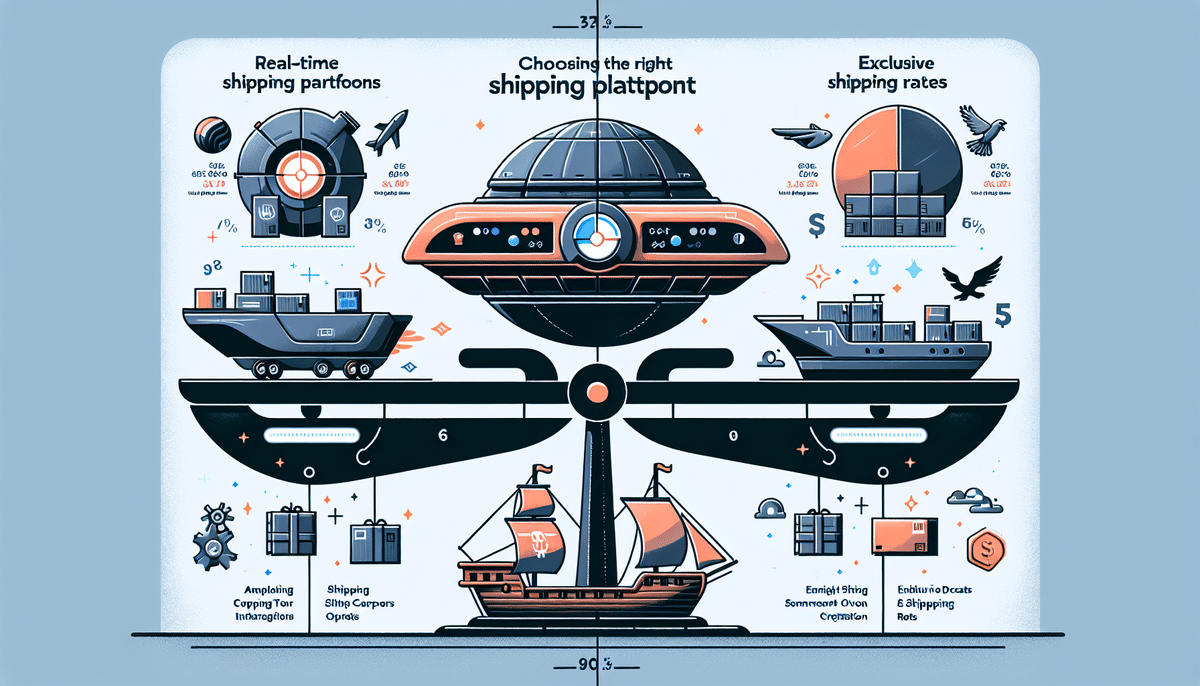Introduction
When it comes to shipping solutions for small businesses, Pirate Ship and ShipStation are two popular options. Both platforms offer similar features, but which one is better for your shipping needs? This article provides an in-depth comparison of Pirate Ship and ShipStation in terms of cost, features, ease of use, customer support, integrations, customization options, and user reviews. We'll also explore the pros and cons of each platform, share case studies of businesses that have utilized these services, discuss alternatives, and offer final thoughts to help you choose the best shipping solution for your business.
Overview of Pirate Ship and ShipStation
Pirate Ship
Pirate Ship is a free-to-use online shipping solution designed primarily for small businesses and individual sellers. It offers access to discounted USPS shipping rates without any monthly fees, making it an attractive option for businesses looking to minimize shipping costs. Key features include the ability to manage and track shipments, print labels, and integrate with various e-commerce platforms.
ShipStation
ShipStation is a comprehensive shipping and order management platform tailored for businesses of all sizes. Unlike Pirate Ship, ShipStation operates on a subscription-based model with different pricing tiers based on monthly shipment volumes. ShipStation supports multiple carriers, including USPS, UPS, FedEx, and DHL, and offers advanced features such as automated shipping rules, customer communication tools, and detailed reporting.
Cost Comparison
Pirate Ship Pricing
Pirate Ship is free to use, with no monthly fees. The platform generates revenue by taking a small percentage of the shipping costs saved through their USPS discounts. This structure allows small businesses to benefit from reduced shipping rates without upfront costs.
ShipStation Pricing
ShipStation offers several pricing tiers:
- Starter: $9/month for up to 50 shipments
- Bronze: $29/month for up to 500 shipments
- Silver: $49/month for up to 1,500 shipments
- Gold: $99/month for up to 3,000 shipments
- Enterprise: Custom pricing for 10,000+ shipments
ShipStation also provides a 30-day free trial, allowing businesses to test the platform before committing to a subscription.
While Pirate Ship is cost-effective for businesses with lower shipping volumes, ShipStation offers scalability for high-volume shippers who require more advanced features and multiple carrier integrations.
Features and Functionality
Pirate Ship Features
- Access to discounted USPS rates
- Shipment management and tracking
- Label printing
- Batch label creation
- Integration with platforms like Shopify, WooCommerce, and Etsy
ShipStation Features
- Multi-carrier support (USPS, UPS, FedEx, DHL, etc.)
- Automated shipping rules
- Customizable packing slips and shipping labels
- Advanced reporting and analytics
- Returns management
- Robust API for custom integrations
ShipStation's extensive feature set caters to businesses seeking comprehensive shipping and order management solutions, while Pirate Ship focuses on providing essential shipping tools with cost savings through USPS discounts.
Ease of Use and Customer Support
Pirate Ship Ease of Use
Pirate Ship boasts a user-friendly interface that simplifies the shipping process. New users can quickly set up accounts, import orders, and print labels with minimal training. The platform offers step-by-step guides and a comprehensive knowledge base to assist users in navigating common tasks.
ShipStation Ease of Use
ShipStation provides a more complex interface due to its advanced features. While it may require a steeper learning curve, the platform offers extensive tutorials, webinars, and a detailed knowledge base to help users maximize its capabilities. ShipStation's dashboard is highly customizable, allowing users to tailor their workspace to their specific needs.
Customer Support
Both Pirate Ship and ShipStation offer multiple customer support channels, including email and chat. Pirate Ship is renowned for its responsive support team and quick issue resolution. ShipStation also provides reliable support, though some users have reported longer wait times during peak shipping seasons.
Integrations and Customization
Integrations
ShipStation excels in integrations, supporting a wide range of e-commerce platforms, marketplaces, accounting software, and CRM systems. This extensive integration capability allows businesses to streamline their operations by connecting various tools within their workflow.
Pirate Ship offers integrations with popular platforms such as Shopify, WooCommerce, and Etsy. Additionally, it supports integrations with crowdfunding platforms like Kickstarter and Indiegogo, catering to businesses launching new products.
Customization Options
ShipStation provides extensive customization options, including custom shipping rules, branded packing slips, and customizable shipping labels. These features allow businesses to tailor the shipping experience to their brand identity and operational requirements.
Pirate Ship offers more limited customization, focusing on providing a straightforward shipping solution without the need for extensive tailoring. This simplicity makes it an ideal choice for small businesses that prefer ease of use over extensive customization.
User Reviews and Ratings
Both Pirate Ship and ShipStation receive positive feedback from users, though their strengths differ based on user needs:
Pirate Ship Reviews
Users appreciate Pirate Ship for its simplicity, cost savings, and excellent customer support. It is particularly favored by small businesses and individual sellers who primarily use USPS for shipping.
ShipStation Reviews
ShipStation is praised for its robust feature set, multi-carrier support, and scalability. Businesses with higher shipping volumes and complex shipping needs find ShipStation's advanced tools highly beneficial. Some users mention that the pricing can be a drawback for smaller businesses.
Pros and Cons
Pirate Ship Pros:
- Free to use with no monthly fees
- Access to discounted USPS shipping rates
- Simple and intuitive user interface
- Excellent customer support
Pirate Ship Cons:
- Limited to USPS for shipping
- Fewer customization options
ShipStation Pros:
- Supports multiple carriers
- Advanced features like automation and reporting
- Highly customizable
- Scalable for businesses of all sizes
ShipStation Cons:
- Monthly fees can be costly for small businesses
- Complex interface may require a learning period
- Some users report slower customer support response times during peak periods
Case Studies
The Futon Shop
The Futon Shop, a small manufacturer and retailer of futon mattresses and frames, utilized Pirate Ship to manage its shipping needs. By leveraging Pirate Ship's discounted USPS rates, The Futon Shop saved over $100,000 in shipping costs within the first year of using the platform.
Jenny's Print Shop
Jenny's Print Shop, an online retailer specializing in personalized stationery, adopted ShipStation to integrate multiple carriers and streamline their shipping process. The automation features of ShipStation saved the company over 50 hours per month, allowing them to focus more on product development and customer service.
Alternatives to Pirate Ship and ShipStation
Several other shipping platforms cater to small businesses, each offering unique features and pricing structures:
- Shippo: Offers multi-carrier support and a pay-as-you-go pricing model.
- Easyship: Provides global shipping solutions with transparent pricing and multiple carrier integrations.
- Ordoro: Focuses on inventory management and shipping automation for growing businesses.
It's essential to evaluate these alternatives based on your specific business needs, shipment volumes, and budget.
How to Choose the Right Shipping Solution for Your Business
When selecting between Pirate Ship and ShipStation, consider the following factors:
- Shipping Volume: Pirate Ship is ideal for businesses with lower shipping volumes seeking cost savings. ShipStation suits high-volume shippers needing advanced features.
- Carrier Preferences: If your business primarily uses USPS, Pirate Ship is a cost-effective choice. Businesses requiring multiple carrier options will benefit from ShipStation.
- Feature Requirements: Assess whether you need advanced features like automation, detailed reporting, and customization. ShipStation offers a more comprehensive feature set.
- Budget: Pirate Ship has no monthly fees, making it attractive for startups and small businesses. ShipStation’s subscription model may be justified by the added features for larger operations.
- Integration Needs: Ensure the platform integrates seamlessly with your existing e-commerce platforms, marketplaces, and other business tools.
Take advantage of free trials offered by both platforms to test their functionalities and determine which aligns best with your business requirements.
Final Thoughts
Choosing the right shipping solution is crucial for optimizing your business operations and enhancing customer satisfaction. Pirate Ship offers an economical and straightforward approach for businesses that primarily ship via USPS and have lower shipping volumes. In contrast, ShipStation provides a robust, feature-rich platform suitable for businesses with diverse shipping needs and higher volumes. Carefully evaluate your business's unique requirements, budget constraints, and growth projections to select the shipping solution that best supports your operational goals.













